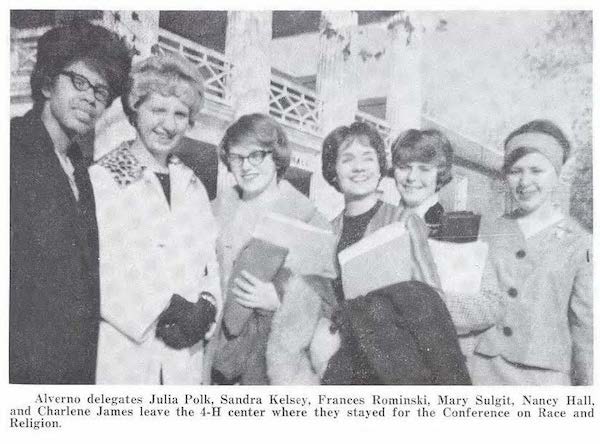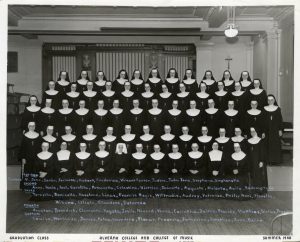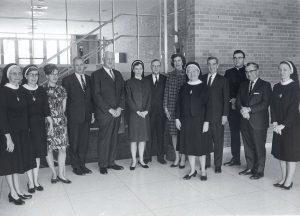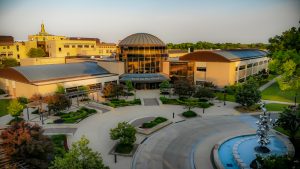Alverno College, a Catholic women’s liberal arts college on Milwaukee’s South Side, is most recognized for its role as an international leader in non-graded, ability-based education.[1] That distinction is closely tied to its founding order, the School Sisters of St. Francis (SSSF), and this order’s dedication to the education of all women across Milwaukee.
Alverno College evolved from three post-secondary institutions in Milwaukee. The first, St. Joseph’s Normal School, was founded in 1887 within the original SSSF motherhouse on Layton Boulevard. The school was established to educate female religious to teach within Catholic parish schools. It became Alverno Teachers College in 1936. St. Joseph’s Convent Conservatory of Music was established in 1924 to train sisters to assist and develop liturgical music for Catholic parishes. And, finally in 1930, the Sacred Heart School of Nursing was founded as a way of furthering the service that the School Sisters could provide to the larger community.[2]
Between 1942 and 1948, Mother Corona Wirfs, Superior General of the School Sisters of St. Francis, guided the merger of Alverno Teachers College, St. Joseph’s Convent Conservatory of Music, and the Sacred Heart School of Nursing into a single, four-year liberal arts college. Alverno Teachers College officially changed its name to Alverno College in August of 1946.[3] Nearly a year and a half later, Sister Augustine Scheele, SSSF, became the first nun to officially take the title of president of Alverno College. That same month, January 1948, Alverno began to admit laywomen as a way of expanding its mission beyond the training of the religious community alone. To respond to the subsequent demand for its programs, Scheele led the campaign to physically consolidate the schools by building the 39th Street and Morgan Avenue campus that opened in the fall of 1953.[4]
Alverno’s first lay board of trustees was founded in February 1968 and was led by women’s rights activist and University of Wisconsin-Madison professor Kay Clarenbach. In that same year, Sister Joel Read was appointed the sixth president of the college. Clarenbach, Read, and Sister Austin Doherty, SSSF, were significant leaders in the Midwest and national women’s movement. All three were founding members of the National Organization for Women. Under their leadership, the faculty, staff, and students of Alverno College carried out a radical transformation of its curriculum. Alverno’s Research Center on Women (1970), childcare or Early Learning Center (1970), internship program (1971), ability-based curriculum (1973), and Weekend College (1977) all developed in response to the various needs of Milwaukee women that emerged out of the women’s movement and in an effort to boost enrollment at the college.[5]
Since its transformation in the 1970s, Alverno has been repeatedly recognized as a national leader in liberal arts education. For example, in 1996 it was awarded a John D. and Catherine T. MacArthur Foundation grant in recognition of its “distinctive approach to liberal arts education.”[6] In the same year, Alverno offered its first graduate program, a Master of Arts for Teachers/Trainers. The college’s graduate programs have expanded to include opportunities for both women and men in business, education, nursing, and psychology.[7]
Alverno College was named Wisconsin’s first Hispanic Serving Institution (HSI) by the United States Department of Education in November 2017.[8] This HSI distinction reflects the institution’s ongoing commitment to serving and responding to the needs of women throughout the Milwaukee community.
Footnotes [+]
- ^ George Kuh, Jillian Kinzie, John Schuh, Elizabeth Whitt, and Associates, Student Success in College: Creating Conditions That Matter (San Francisco, CA: Jossey-Bass, 2005), 29-30; Alexander Astin, Are You Smart Enough? How Colleges’ Obsession with Smartness Shortchanges Students (Sterling, VA: Stylus Publishing, LLC, 2016), 77.
- ^ “From an Acorn to Oak Tree,” Alverno College Dedication Book (April 21, 1954), 18-19.
- ^ “130 Years and Counting! Highlights from Alverno’s History,” Alverno Library website, last accessed April 15, 2018; Alverno College General Bulletin, 1953-1955 (April 1953), 19-20.
- ^ Alverno College, Sharing a Century: The First Hundred Years of Teaching at Alverno (Milwaukee: Alverno College, 1987), 1-2.
- ^ Gerda Lerner, Living with History/Making Social Change. (Chapel Hill, NC: University of North Carolina Press, 2009), 89-98.
- ^ Karen Arenson, “6 Colleges with Bit of Genius Are Given $750,000 Rewards,” New York Times, June 26, 1996; “$750,000 MacArthur Grant Cites Alverno as ‘National Resource and Model,’” Alverno Magazine (Summer 1996), last accessed April 15, 2018.
- ^ Alverno College Graduate Programs website, last accessed April 15, 2018.
- ^ Karen Herzog, “Alverno Becomes First Wisconsin College to Achieve Coveted Hispanic Institution Designation,” Milwaukee Journal Sentinel, November 9, 2017.
For Further Reading
Alverno College. Sharing a Century: The First Hundred Years of Teaching at Alverno. Milwaukee: Alverno College, 1987.
Borgia, Sister M. Francis, OSF. He Sent Two; The Story of the Beginnings of the School Sisters of St. Francis. Milwaukee: Bruce Publishing Company, 1965.
Mentkowski, Marcia, and Associates. Learning that Lasts: Integrating Learning, Development, and Performance in College and Beyond. San Francisco, CA: Jossey-Bass Publishers, 2000.
School Sisters of St. Francis. Undaunted They Walked: The History of the Congregation of the School Sisters of St. Francis: 1942-2012. Strasbourg: Ed. du Signe, 2014.




0 Comments
Please keep your community civil. All comments must follow the Encyclopedia of Milwaukee Community rules and terms of use, and will be moderated prior to posting. Encyclopedia of Milwaukee reserves the right to use the comments we receive, in whole or in part, and to use the commenter's name and location, in any medium. See also the Copyright, Privacy, and Terms & Conditions.
Have a suggestion for a new topic? Please use the Site Contact Form.